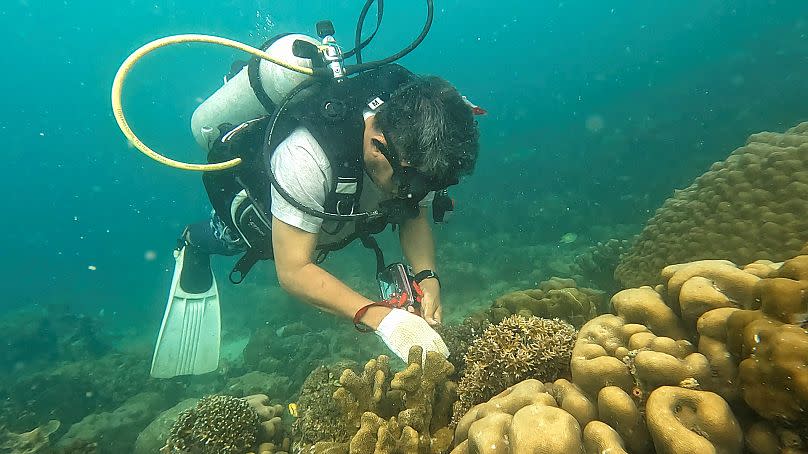Meet the ex-poachers restoring the Indonesian coral reefs they destroyed
Twenty years ago, the coral reefs in the waters of Spermonde Islands in Indonesia were nothing more than debris.
Poachers bombed and poisoned corals to catch fish - methods ruled illegal by the government and punishable by up to six years in prison.
Now, the same poachers have become conservationists, working together to rehabilitate the corals they destroyed. They work under the guidance of scientist and university professor Syafyudin Yusuf, who had spent two decades fighting to save the reefs.
"We enter their lives and try to influence their souls and mindsets to be able to change from destructive fishing to being conservationists," Yusuf says as his students, the former poachers, dip their hands into tanks of salvaged corals.
‘Vaquita are survivors’: World’s rarest marine mammal clings on at the edge of extinction
Why a ‘virgin’ crocodile pregnancy has ‘tantalising’ implications for dinosaur researchers
Turning from poaching to conservation
The Spermonde consist of more than 120 small islands riddled with coral reefs.
In 2009, only 2 per cent of these reefs remained in good condition according to Makassar's Hasanuddin University research. On Badi Island -- where Yusuf had focused his efforts -- three hectares of coral reefs had been damaged.
Illegal fishing methods became popular as the demand for fish and exotic corals spiked.
"We needed to live and survive, but chances of getting a decent job is difficult," said former poacher Haji Dahrin. "The only job we knew of was that (illegal methods of fishing), that's how we began bombing (reefs)."

Yusuf, known by local fishermen as "Mr Ipul," managed to restore two hectares of the destroyed coral reef alongside his former poachers. They install structures known as spider module frames that support coral regeneration.
His efforts, however, were met with resistance at first. Former poacher turned conservationist Muhammad Arif recalls how local fishermen initially thought Yusuf's ways would deprive them of their livelihood.
"We thought he would actually destroy the corals and our lives, but he was the one who educated us that corals are essential for fish life," he said.
"So Mr. Ipul (Yusuf) gave us knowledge and our welfare has increased by maintaining and caring for coral reefs."
‘We must end this war on nature’: Europe’s most endangered species in need of protection
India’s weirdest frog and an ‘ugly shark’: These species aren't cuddly but they still need saving
Coral reefs need to be preserved for future generations
According to Greenpeace records, coral reefs in Indonesia cover as much as 50,875 square kilometres. This is around 18 per cent of the total area of the world's coral reefs and 65 per cent of the total area in the coral triangle.
"The coral triangle of Indonesia, Philippines, and the Indo-Pacific essentially...must be preserved so that world heritage in the water or ocean will be maintained for coming generations," Yusuf emphasises.

"I think this is a small effort that can influence the world to preserve coral reefs in the future.”
He is now branching out his efforts into two neighbouring islands, Barrang Lompo and Samalona, which have two and 2.5 hectares of damage respectively.
Yusuf believes his and the reformed fishermen's fight for coral rehabilitation still has a long way to go.
Watch the video above to see ex-poachers work hand in hand with conservationists.


